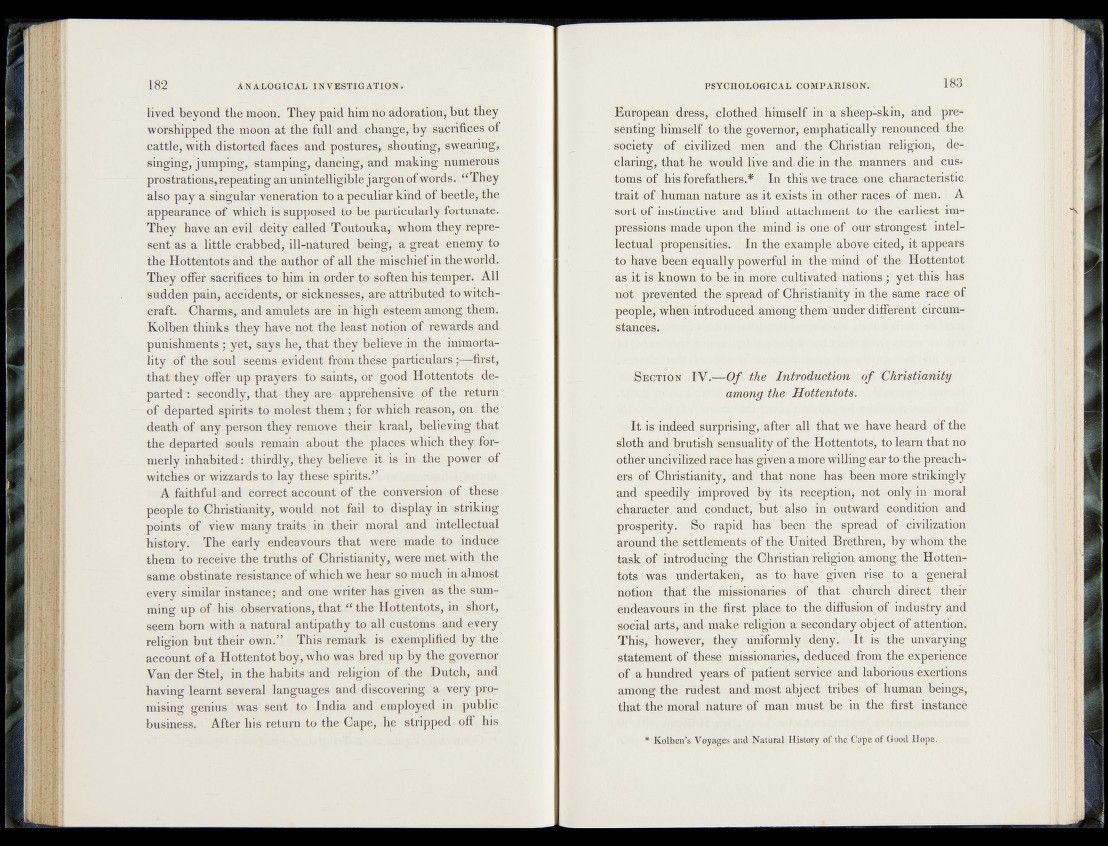
lived beyond the moon. They paid him no adoration, but they
worshipped the moon at the full ahdaehange, by sacrifices of
cattle, with distorted faces and postures, shouting, swearing,
singing, jumping, stamping, dancing, and making numerous
prostrations, repeating an unintelligible jargonof words. They
also pay a singular veneration to a peculiar kind of beetle, the
appearance of which is supposed to be particularly fortunate.
They have an evil deity called Toutouka, whom they represent
as a little crabbed, ill-natured being, a great enemy to
the Hottentots and the author of all the mischief in the world.
They offer sacrifices to him in order to soften his temper. All
sudden pain, accidents, or sicknesses, are attributed to witchcraft.
Charms, and amulets are in high esteem among them.
Kolben thinks they have not the least notion of rewards and
punishments ; yet, says he, that they believe in the immortality
o f the soul seems evident from these particulars;—first,
that they offer up prayers to saints, or good Ilbttentots departed:
secondly, that they are apprehensive- of the return
of departed spirits to molest them ; for which reason-, on the
death of any person they remove their kraal, believing that
the departed souls remain about the places which they formerly
inhabited: thirdly, they believe it is in the power of
witches or wizzards to lay these spirits.”
A faithful and correct account of the conversion of these
people to Christianity, would not fail to display in striking
points of view many traits in their moral and intellectual
history. The early endeavours that were made to induce
them to receive the truths of Christianity, were met with the
«amp obstinate resistance of which we hear, so much in almost
every similar instance; and one writer has given as the summing
up of his observations, that “ the Hottentots, in short,
seem bom with a natural antipathy to all customs and every
religion but their own.” This remark is exemplified by the
account of a Hottentot boy, who was bred up by the governor
Van der Stel, in the habits and religion of the Dutch, and
having leamt several languages and discovering a very promising
genius was sent to India and employed in public
business. After liis return to the Cape, he stripped off his
European dress, clothed himself in a sheep-skin, and presenting
himself to the governor, emphatically renounced the
society of civilized men and the Christian religion, declaring,
that he would live and die in the manners and cus-
toms of his forefathers.* In this we trace one characteristic
trait of human nature as it exists in ether races of men. A
sort of instinctive and blind attachment to the earliest impressions
made upon the mind is one of our strongest intellectual
propensities. In the example above cited, it appears
to have been equally powerful in the mind of the Hottentot
as it is known to be in more cultivated nations ; yet this has
not prevented the spread of Christianity in the same race of
people, when introduced among them under different circumstances.
Section TV.-^-Of the Introduction o f Christianity
among the Hottentots.
It is indeed surprising, after all that we have heard of the
sloth and brutish sensuality of the Hoftmtotsy to leam that no
other uncivilized race has given a more willing ear to the preachers
of Christianity, and that none has been more strikingly
and speedily improved by its reception, not only in moral
character and conduct, but also in outward condition and
prosperity. So rapid has been the spread of civilization
around the settlements of the United Brethren, by whom the
task of introducing the Christian religion among the Hottentots
was undertaken, as to have given rise to a general
notion that the missionaries of that church direct their
endeavours in the first place to the diffusion of industry and
social arts, and make religion a secondary object of,attention.
This, however, they uniformly deny. It. in the unvarying
statement of these missionaries, deduced from the experience
of a hundred years of patient service and laborious exertions
among the rudest and most abject tribes of human beings,
that the moral nature of man must be in the first instance
* Kolben’s Voyages and Natural History of the. Cape of Good Hope.